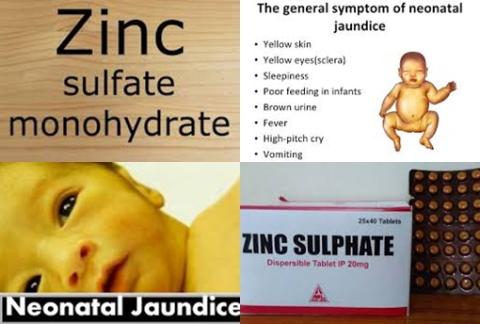
Objectives:
Zinc sulfate may be a promising approach to treat neonatal jaundice. However, the results remain controversial. Therefore, this review article (meta-analysis) has been conducted.
Does zinc sulfate supplementation reduce neonatal jaundice?
Study design:
This review article included 5 RCTs involving 645 patients.
Results and conclusions:
The investigators found overall, compared with placebo, zinc sulfate supplementation failed to significantly reduce total serum bilirubin on 3 days [mean difference = 0.09 mg/dL, 95% CI = -0.49 to 0.67, p = 0.77]. Non-significant because p-value of 0.77 was greater than p-value of 0.05.
The investigators found overall, compared with placebo, zinc sulfate supplementation failed to significantly reduce total serum bilirubin on 7 days [mean difference= -0.37 mg/dL, 95% CI= -98 to 0.25, p = 0.25].
The investigators found overall, compared with placebo, zinc sulfate supplementation failed to significantly reduce the incidence of hyperbilirubinemia [OR = 1.14, 95% CI = 0.74 to 1.76, p = 0.56].
The investigators found overall, compared with placebo, zinc sulfate supplementation showed no influence on phototherapy requirement [OR = 0.90, 95% CI = 0.41 to 1.98, p = 0.79]. Non-significant because OR of 1 was found in the OR of 0.41 to 1.98. OR of 1 means no risk/association.
The investigators found overall, compared with placebo, zinc sulfate supplementation significantly decreased duration of phototherapy [mean difference = -16.69 h, 95% CI = -25.09 to -8.3 h, p 0.000].
The investigators concluded zinc sulphate supplementation does not reduce the total serum bilirubin on 3 days and 7 days, the incidence of hyperbilirubinemia and phototherapy requirement, but significantly decreases duration of phototherapy.
Original title:
The influence of zinc sulfate on neonatal jaundice: a systematic review and meta-analysis by Yang L, Wu, [...], Tang J.
Link:
https://www.ncbi.nlm.nih.gov/pubmed/28372469
Additional information of El Mondo:
Find more information/studies on pregnancy and zinc right here.
Neonatal jaundice occurs when a baby has a high level of bilirubin in the blood. Bilirubin is a yellow substance that the body creates when it replaces old red blood cells. The liver helps break down the substance so it can be removed from the body in the stool.
A high level of bilirubin makes a baby's skin and whites of the eyes look yellow. This is called neonatal jaundice.
Jaundice is a common and usually harmless condition in newborn babies.
The symptoms of neonatal jaundice usually develop 2 to 3 days after the birth and tend to get better without treatment by the time the baby is about 2 weeks old.